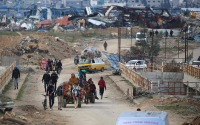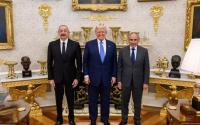Timothy Garton Ash27 June, 2002
Imagine a wedding party delayed for 15 years by the meanness and prevarication of the bridegroom. Who would have any pleasure in it when it finally came? Such now is the reunification of Europe: the wedding of the eastern and western parts of the continent divided for decades by the walls and barbed wire of the cold war. Even the name for the party has become a bore. No longer the reunification or, as we used also to say, the healing of Europe, it is just "EU enlargement" - yawn, yawn, and turn off the set.
Last week's Seville summit reaffirmed the commitment of the EU to bring in 10 new states by the end of 2004 - a mere 15 years after the fall of the Berlin Wall. At the same time, it postponed the hardest financial negotiations until after the German elections this autumn. And in Seville, the EU's leaders were more interested in keeping people out than in bringing people in. Not welcoming fellow Europeans but hounding illegal immigrants - that's the hot topic in a EU-rope shaken by anti-immigrant populism.
Some readers, now inevitably more than 30 years old, may still remember that dizzy summer 13 years ago, in 1989, when communism was being peacefully dismantled in new-style refolutions (a mixture of reform and revolution) in Poland and Hungary, and the world was full of hope. "The return to Europe" was the central Europeans' great slogan then.
What went wrong? We did. We, the west Europeans. For a start, many west Europeans never really thought of those "faraway countries of which we know little" as part of Europe anyway. Others, notably in France, did not want these countries to join our French-led, rich man's club at all. A leading French businessman once privately summed up his attitude to the eastward enlargement of the EU thus: il faut toujours en parler et jamais y penser (one should always talk about it and never think about it). Then Helmut Kohl and François Mitterrand decided that western Europe had first to make its own monetary union. A fine idea, and thus far much more successful than many doubters (including me) expected, but was it the right priority at a time when the 40-year-old division of Europe into east and west had just ended? It was not.
Now the EU's leaders have finally agreed that we must do the enlargement, but no one intends to pay for it. The net contributors to the EU budget, above all Germany, are damned if they'll pay a euro more, and the net benefactors, such as Spain, are damned if they'll take a euro less. The net sum that the EU proposes to transfer to its 10 new members over the three years from 2004 to 2006 is about €25bn. For comparison, under the Marshall Plan, the US transferred the equivalent of €97bn (at today's prices) to western Europe over the four years from 1948 to 1951, and in the 1990s West Germany transferred to East Germany some €600bn. (I owe these figures to the International Herald Tribune, which recently completed a fine three-part series on this topic.) So much for the great solidarity of Europeans with Europeans.
On current plans, new member states, most of them poor by EU standards, will receive just half the sum per capita that countries like Spain, Portugal, Greece and Ireland get for infrastructure projects such as roads and bridges. Meanwhile, Polish farmers are to receive just a quarter of the direct subsidies that their French counterparts do, although they will be competing in the same single market. This is insulting nonsense. What should happen is that all EU farmers should receive only a quarter of what they do today, since the common agricultural policy (CAP) is the longest running scandal in the developed world - forcing up the price of the food we eat and further disadvantaging farmers in the developing world. But France and other CAP beneficiaries won't stand for that. In Europe's name, of course.
I've thus far written as if eastward enlargement, with all its disappointments, will definitely go ahead in 2004. Even that is not certain. Ireland has to have another referendum on the Nice treaty, to which it has once already said no. Greece has said it will block enlargement unless Cyprus is included, though how you incorporate a divided country into the EU is unclear. Anti-immigrant populists from Haider to Le Pen increase the domestic opposition.
Yet the most worrying development is the growth of hostility towards the EU inside the candidate countries. In six of the 10 front-runners, less than 50% of those asked in a recent opinion poll said that membership of the EU would be a good thing for their country. In Poland, much the largest and most important of the candidates, the figure was just 51%. "Yesterday Moscow, tomorrow Brussels" say Poland's growing band of eurosceptics. Of course that's unfair, because Poland never chose to join the Soviet bloc, whereas its democratically elected governments since 1989 have consistently been knocking at Brussels' door. But you can feel that way when the emissaries of Brussels are imposing 80,000 pages of rules and regulations on your country - many of them hampering an otherwise dynamic new market economy.
The most extraordinary and depressing prospect is that, at the end of the day, it might be Poland that rejects its own new membership of the EU in a referendum. This may sound far-fetched but is not unthinkable. Under the Polish constitution, a referendum on such a major issue requires a simple majority on a turn-out that is more than 50% . At the last parliamentary elections, turn-out was 46%. So all the opponents need to say is "stay at home, and have another beer".
In the end, I don't think that will happen. I think enlargement will finally go ahead in 2004 or 2005: scandalously late, but better late than never. Yet the fact that we even face such a possibility shows how far we have sunk. Travelling to and fro across the iron curtain in the bad old days of the cold war, I concluded that Europe was divided between those in the west, who had Europe, and those in the east, who believed in it. I will never forget walking down the corridors of the Polish parliament, soon after the pathbreaking Polish elections of 1989, with the historian and Solidarity leader, Bronislaw Geremek. Suddenly he stopped and said, with passion: "You know, for me Europe is a kind of Platonic essence."
Had the reunification of Europe happened 10 years ago, a huge positive charge of such idealism and enthusiasm would have flown into the European project from the liberated east. I still hope that a little of it will, from great Europeans like my old friend Bronislaw Geremek. But for the most part the new members, if and when they get in, will have concluded that Europe is really about haggling behind closed doors to pocket a few more million euros for one of your national special interests. That is the lesson we will have taught in 15 years of visionless, mean-spirited wrangling.






